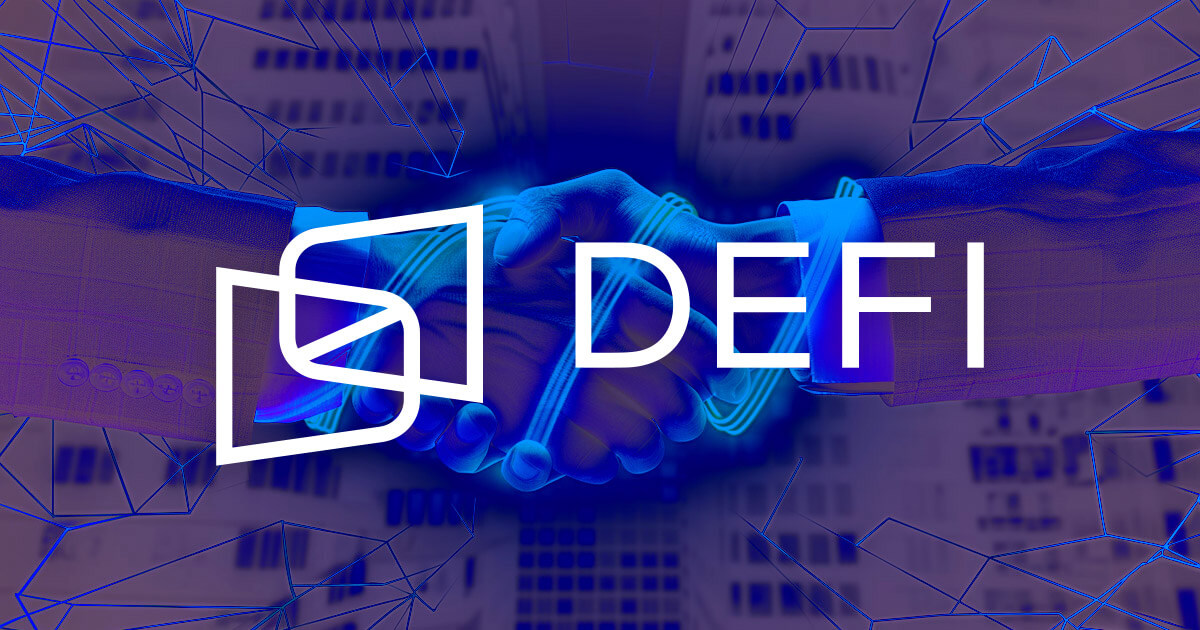DeFi
Identity challenges in defi: unlocking institutional investment

Overcoming identity challenges in defi is crucial for institutional investment. Explore solutions to unlock this trillion-dollar bottleneck.
Decentralized finance (defi) is rapidly transforming the financial landscape, offering unprecedented opportunities for innovation and democratization of financial services.
However, despite the buzz and potential, institutional investment in defi remains surprisingly low. According to analysts, this gap is not due to a lack of interest but rather significant compliance challenges that traditional financial (tradfi) institutions face when considering defi investments.
Institutional investors are accustomed to a well-regulated environment where compliance with know-your-customer (KYC) and know-your-business (KYB) regulations is mandatory.
These regulations are designed to prevent fraud, money laundering, and other illicit activities by ensuring that entities engaging in financial transactions are verified and legitimate.
However, the decentralized nature of defi presents unique challenges to meeting these regulatory requirements. Let’s explore the complexities and potential solutions for these identity challenges and their implications for the future of decentralized finance.
The institutional investment bottleneck in defi
In an interview with crypto.news, Piers Ridyard, CEO of RDX Works, stated that compliance concerns are the primary obstacle hindering institutional investment in the defi space.
Ridyard further emphasized the pivotal need for institutional blockchain compliance frameworks that mirror the features and functionality of permissionless defi, enabling institutions to leverage the full potential of decentralized finance.
Additionally, he underscored the urgency of developing innovative identity solutions capable of applying intricate identity rule sets to marketplaces without impeding the liquidity of underlying assets.
He pointed out that without such solutions, institutional investors’ participation is limited, and the flow of assets and the activity in markets that attract these investors are also hindered.
To unlock the power of DeFi for institutions requires the creation of a new set of identity tools that allow complex identity rule sets to be applied to marketplaces without preventing the underlying liquidity of those instruments to be affected. Without identity solutions that do not hamstring the secondary liquidity of assets and marketplaces that institutional investors are interested in, the DeFi space will be mainly locked out for institutions.
Piers Ridyard, CEO of RDX Works
He contends that without viable identity solutions safeguarding secondary liquidity, defi remains largely inaccessible to institutions, stymieing its evolution into a mainstream financial ecosystem.
Major compliance challenges in defi
Data privacy
While pseudonymity is a feature of many cryptocurrencies, it often brings privacy concerns and challenges with data protection regulations. To align with the law, financial platforms must balance maintaining user privacy and meeting regulatory compliance, especially for users holding significant assets.
Token classification and securities laws
Another compliance challenge facing the decentralized space is whether a cryptocurrency or token qualifies as a security and falls under securities legislation.
For traditional financial institutions to get involved with decentralized finance, regulators must clarify the legal status of the many different tokens used in DeFi protocols. Compliance with securities laws can be complex and has significant legal consequences.
Uncertain regulatory environment
Continuing the point mentioned above, the constantly evolving landscape of digital currency regulations across various jurisdictions also presents significant difficulties for tradfi.
The lack of clarity on how cryptocurrencies should be classified, taxed, and regulated has created uncertainty for businesses and users in the decentralized finance space.
Emerging technologies
While the defi space has kept innovating with new technologies such as decentralized identities (DIDs) and decentralized autonomous organizations (DAOs), these advancements bring additional compliance challenges.
As a result, regulatory agencies often struggle to understand and adapt to these advancements and are constantly left having to play catch-up as the industry progresses.
Cross-border transactions
As much as cryptocurrency facilitates borderless transactions, differing regulations across countries can complicate international transfers. It means that defi platforms and defi users must navigate varying regulatory standards to maintain compliance with global activities.
Rapid user growth
According to the latest data from Statista, more than 5.2 million unique addresses had either bought or sold defi assets by the end of April 2024.
Although it was a considerable dip from the March 2024 figure of 6.8 million unique users, the latest number still represents a 41% increase year over year.
Number of unique addresses buying and selling defi assets globally | Source: Statista
Per the data, the number of unique defi users has increased by nearly 700% over two years.
This rapid increase presents numerous challenges, including compliance and scalability issues for defi platforms. It has made it difficult for defi protocols to maintain robust compliance processes and procedures as user numbers surge.
The identity challenge in defi
Apart from the challenges mentioned above, a recent study by London-based hedge fund managers Nickel Digital Asset Management identified compliance with KYC and anti-money laundering (AML) regulations as major hurdles keeping tradfi institutions away from defi.
Nearly half of the participants (47%) expressed concerns about the complexities associated with KYC and AML compliance in the defi sector.
Returning to Ridyard, the RDX Works CEO emphasized that overcoming compliance barriers such as KYC and KYB requirements in defi necessitates fundamentally reevaluating how identity is conceptualized, managed, and processed within decentralized finance ecosystems.
Limitations of current layer-1 networks
Layer-1 (L1) networks like Ethereum (ETH), which form the backbone of many defi applications, face significant limitations in integrating identity with asset control. On these networks, identities and assets are often tied to a single private key.
This approach is inherently flawed for several reasons:
- Security vulnerabilities: A single point of failure means that if the private key is compromised, all associated assets could be at risk.
- Lack of flexibility: Binding identity and assets to one key may limit the ability to manage identities and assets separately.
- Inefficiency: Some analysts feel this approach is not scalable and may not accommodate the nuanced requirements of institutional investors who need robust identity management systems.
In his submission, Ridyard highlighted the conventional assumption prevalent on L1s that users are synonymous with their accounts and validate their identity solely through a single private key. In his opinion, this falls short of meeting compliance standards.
Moreover, Ridyard underscored the inadequacy of identity solutions mandating the inclusion of all user identity information onto the blockchain, regardless of encryption.
Instead, he outlined that emerging independent L1 protocols tackle this challenge by integrating identity solutions directly into the blockchain architecture.
According to him, these solutions aim to balance privacy protection with facilitating selective disclosures required for compliance adherence.
Risks associated with a one-size-fits-all approach
The current one-size-fits-all approach to identity and asset management in defi can create multiple risks, including the following:
- Security vulnerabilities: A compromised private key can lead to the theft of all associated assets.
- Lack of flexibility: Institutions require the ability to manage multiple identities and roles within their organizations, which is not feasible with a single private key.
- Inefficiency: The current system does not allow for efficient management of assets and identities, leading to operational bottlenecks.
Potential solutions
Separation of identity and assets
One promising solution to the problems highlighted above is the separation of identity and assets. This approach allows defi users to manage their identities separately from their assets, enhancing security and control.
Additionally, by decoupling these elements, defi platforms can offer a more flexible and secure experience, aligning more closely with the needs of institutional investors.
Touching on this potential solution, the RDX Works CEO said, “When we log in to an application, we want to be able to separate who we are from what we own. To control our accounts and assets, we don’t want a single easily-lost-or-stolen key that we can’t change,”
Multi-factor authentication
Introducing multi-factor authentication (MFA) into defi platforms can also provide a bank-like security experience.
MFA requires multiple forms of personal proof, such as something you know (password), something you have (hardware token), and something you are (biometric verification).
This layered security approach can significantly reduce the risk of unauthorized access and asset theft.
Application-specific identities
Another solution being developed by companies like Radix DLT is the use of application-specific identities. It allows users to create distinct identities for different decentralized applications (dapps), ensuring privacy and security.
By compartmentalizing identities, users can mitigate the risk of a single point of failure and maintain greater control over their personal information.
Credential verification on the network
Facilitating compliance through credential verification on the network is crucial. It involves allowing verified credentials to be shared securely without exposing private information. Such a system can enable defi platforms to meet regulatory requirements while preserving user privacy and decentralization.
“Radix provides these primitives by separating the concept of the account from the concept of identity,” Ridyard explained. “Many accounts can be bound to a single identity, separating ‘actor’ and ‘assets’ in a manner similar to traditional compliance structures.”
The Implications for institutional investors
Meeting compliance needs
Defi platforms that integrate robust identity solutions can meet the compliance needs of institutional investors. By providing a secure, flexible, and compliant environment, these platforms can attract significant institutional capital. It will not only enhance the credibility of defi but also drive its mainstream adoption.
Unlocking $100 trillion in capital
The potential for unlocking an estimated $100 trillion in institutional capital cannot be overstated. This influx of investment can bring unprecedented liquidity to defi markets, facilitating more efficient and scalable financial services.
Furthermore, institutional involvement can also spur innovation as new products and services are developed to meet the needs of these large investors.
Sharing his view on the potential implication on the broader defi ecosystem of unblocked institutional capital, Ridyard remarked, “Institutional capital entering defi has the potential to be a transformative force. It is likely the catalyst needed to bring defi mainstream and to the masses.”
Broader impact on the defi ecosystem
Increased institutional participation can also have a ripple effect across the defi ecosystem. Experts like Ridyard believe enhanced liquidity can lead to more stable and efficient markets, while the influx of capital could drive innovation and development.
Additionally, integrating robust identity solutions can enhance the overall security and trustworthiness of defi platforms, benefiting all users.
Conclusion
The transformative potential of defi lies in its ability to democratize finance and provide open access to financial services. However, to fully realize this potential, addressing the identity challenges that hinder institutional investment is crucial.
By developing solutions such as the separation of identity and assets, multi-factor authentication, application-specific identities, and credential verification on the network, defi platforms can bridge the gap between decentralized finance and traditional financial institutions.
DeFi
Pump.Fun is revolutionizing the Ethereum blockchain in terms of daily revenue

The memecoin launchpad saw the largest daily revenue in all of DeFi over the past 24 hours.
Memecoin launchpad Pump.Fun has recorded the highest gross revenue in all of decentralized finance (DeFi) in the last 24 hours, surpassing even Ethereum.
The platform has raised $867,429 in the past 24 hours, compared to $844,276 for Ethereum, according to DeFiLlama. Solana-based Telegram trading bot Trojan was the third-highest revenue generator of the day, as memecoin infrastructure continues to dominate in DeFi.
Pump.Fun generates $315 million in annualized revenue according to DeFiLlama, and has averaged $906,160 per day over the past week.
Income Ranking – Source: DeFiLlama
The memecoin frenzy of the past few months is behind Pump.fun’s dominance. Solana-based memecoins have been the main drug of choice for on-chain degenerates.
The app allows non-technical users to launch their own tokens in minutes. Users can spend as little as $2 to launch their token and are not required to provide liquidity up front. Pump.Fun allows new tokens to trade along a bonding curve until they reach a set market cap of around $75,000, after which the bonding curve will then be burned on Raydium to create a safe liquidity pool.
Pump.Fun generates revenue through accrued fees. The platform charges a 1% fee on transactions that take place on the platform. Once a token is bonded and burned on Raydium, Pump.fun is no longer able to charge the 1% fee.
Ethereum is the blockchain of the second-largest cryptocurrency, Ether, with a market cap of $395 billion. It powers hundreds of applications and thousands of digital assets, and backs over $60 billion in value in smart contracts.
Ethereum generates revenue when users pay fees, called gas and denominated in ETH, to execute transactions and smart contracts.
DeFi
DeFi technologies will improve trading desk with zero-knowledge proofs

DeFi Technologies, a Canadian company financial technology companyis set to enhance its trading infrastructure through a new partnership with Zero Computing, according to a July 30 statement shared with CryptoSlate.
The collaboration aims to integrate zero-knowledge proof tools to boost operations on the Solana And Ethereum blockchains by optimizing its ability to identify and execute arbitrage opportunities.
Additionally, it will improve the performance of its DeFi Alpha trading desk by enhancing its use of ZK-enabled maximum extractable value (MEV Strategies).
Zero knowledge Proof of concept (ZKP) technology provides an additional layer of encryption to ensure transaction confidentiality and has recently been widely adopted in cryptographic applications.
Optimization of trading strategies
DeFi Technologies plans to use these tools to refine DeFi Alpha’s ability to spot low-risk arbitrage opportunities. The trading desk has already generated nearly $100 million in revenue this year, and this new partnership is expected to further enhance its algorithmic strategies and market analysis capabilities.
Zero Computing technology will integrate ZKP’s advanced features into DeFi Alpha’s infrastructure. This upgrade will streamline trading processes, improve transaction privacy, and increase operational efficiency.
According to DeFi Technologies, these improvements will increase the security and sophistication of DeFi Alpha’s trading strategies.
The collaboration will also advance commercial approaches for ZK-enabled MEVs, a new concept in Motor vehicles which focuses on maximizing value through transaction fees and arbitrage opportunities within block production.
Additionally, DeFi Technologies plans to leverage Zero Computing technology to develop new financial products, such as zero-knowledge index exchange-traded products (ETPs).
Olivier Roussy Newton, CEO of DeFi Technologies, said:
“By integrating their cutting-edge zero-knowledge technology, we not only improve the efficiency and privacy of our transactions, but we also pave the way for innovative trading strategies.”
Extending Verifiable Computing to Solana
According to the release, Zero Computing has created a versatile, chain-agnostic platform for generating zero-knowledge proofs. The platform currently supports Ethereum and Solana, and the company plans to expand compatibility with other blockchains in the future.
The company added that it is at the forefront of introducing verifiable computation to the Solana blockchain, enabling complex computations to be executed off-chain with on-chain verification. This development represents a significant step in the expansion of ZKPs across various blockchain ecosystems.
Mentioned in this article
Latest Alpha Market Report
DeFi
Elastos’ BeL2 Secures Starknet Grant to Advance Native Bitcoin Lending and DeFi Solutions

Singapore, Asia, July 29, 2024, Chainwire
- Elastos BeL2 to Partner with StarkWare to Integrate Starknet’s ZKPs and Cairo Programming Language with BeL2 for Native DeFi Applications
- Starknet integration allows BeL2 to provide smart contracts and dapps without moving Bitcoin assets off the mainnet
- Starknet Exchange Validates the Strength of BeL2’s Innovation and Leadership in the Native Bitcoin Ecosystem
Elastos BeL2 (Bitcoin Elastos Layer2) has secured a $25,000 grant from Starknet, a technology leader in the field of zero-knowledge proofs (ZKPs). This significant approval highlights the Elastos BeL2 infrastructure and its critical role in advancing Bitcoin-native DeFi, particularly Bitcoin-native lending. By integrating Starknet’s ZKPs and the Cairo programming language, Elastos’ BeL2 will enhance its ability to deliver smart contracts and decentralized applications (dapps) without moving Bitcoin (BTC) assets off the mainnet. This strategic partnership with Starknet demonstrates the growing acceptance and maturity of the BeL2 infrastructure, reinforcing Elastos’ commitment to market leadership in the evolving Bitcoin DeFi market.
Starknet, developed by StarkWare, is known for its advancements in ZKP technology, which improves the privacy and security of blockchain transactions. ZKPs allow one party to prove to another that a statement is true without revealing any information beyond the validity of the statement itself. This technology is fundamental to the evolution of blockchain networks, which will improve BeL2’s ability to integrate complex smart contracts while preserving the integrity and security of Bitcoin.
“We are thrilled to receive this grant from Starknet and announce our partnership to build tighter integrations with its ZKP technology and the Cairo programming language,” said Sasha Mitchell, Head of Bitcoin Layer 2 at Elastos. “This is a major milestone for BeL2 and a true recognition of the maturity and capabilities of our core technology. This support will allow us to further develop our innovation in native Bitcoin lending as we look to capitalize on the growing acceptance of Bitcoin as a viable alternative financial system.”
A closer integration with Cairo will allow BeL2 to leverage this powerful programming language to enhance Bitcoin’s capabilities and deliver secure, efficient, and scalable decentralized finance (DeFi) applications. Specifically, the relationship with Cairo reinforces BeL2’s core technical innovations, including:
- ZKPs ensure secure and private verification of transactions
- Decentralized Arbitrage Using Collateralized Nodes to Supervise and Enforce Fairness in Native Bitcoin DeFi
- BTC Oracle (NYSE:) facilitates cross-chain interactions where information, not assets, is exchanged while Bitcoin remains on the main infrastructure
BeL2’s vision goes beyond technical innovation and aims to innovate by creating a new financial system. The goal is to build a Bitcoin-backed Bretton Woods system, address global debt crises, and strengthen Bitcoin’s role as a global hard currency. This new system will be anchored in the integrity and security of Bitcoin, providing a stable foundation for decentralized financial applications.
As integration with Starknet and the Cairo programming language continues, BeL2 will deliver further advancements in smart contract capabilities, decentralized arbitration, and innovative financial products. At Token 2049, BeL2 will showcase further innovations in its core technologies, including arbitrators, that will underscore Elastos’ vision for a fairer decentralized financial system rooted in Bitcoin.
About Elastos
Elastos is a public blockchain project that integrates blockchain technology with a suite of redesigned platform components to produce a modern Internet infrastructure that provides intrinsic privacy and ownership protection for digital assets. The mission is to create open source services that are accessible to the world, so developers can create an Internet where individuals own and control their data.
The Elastos SmartWeb platform enables organizations to recalibrate how the Internet operates to better control their own data.
https://www.linkedin.com/company/elastosinfo/
ContactPublic Relations ManagerRoger DarashahElastosroger.darashah@elastoselavation.org
DeFi
Compound Agrees to Distribute 30% of Reserves to COMP Shareholders to End Alleged Attack on Its Governance

Compound will introduce the staking program in exchange for Humpy, a notorious whale accused of launching a governance attack on the protocol, negating a recently adopted governance proposal.
Compound is launching a new staking program for COMP holders as a compromise with Humpy, a notorious DeFi whale accused of launching a governance attack against the veteran DeFi protocol.
On July 29, Bryan Colligan, head of business development at Compound, published a governance proposal outlining plans for a new compound participation product that would pay 30% of the project’s current and future reserves to COMP participants.
Colligan noted that the program was requested by Humpy in exchange for his agreement Proposition 289 — which sought to invest 499,000 COMP worth approximately $24 million into a DeFi vault controlled by Humpy, and which appears to have been forced by Humpy and his associates over the weekend.
“We propose the following staking product that meets Humpy’s stated interests as a recent new delegate and holder of COMP in exchange for the repeal of Proposition 289 due to the governance risks it poses to the protocol,” Colligan said. “The Compound Growth Program…will execute the above commitments, given the immediate repeal of Proposition 289.”
Colligan added that the proposal would expire at 11:59 p.m. EST on July 29. Had Humpy not rescinded Proposition 289, Compound would move forward with it. Proposition 290 — block Humpy using the Compound team’s multi-sig to deploy a new governor contract removing the delegate’s governance power behind Proposition 289.
Hunchback tweeted that Proposition 289 had been repealed a few hours ago. “Glad to have brought Compound Finance back into the spotlight,” they said. added. “StakedComp… finally becomes a yield-generating asset!
Markets reacted favorably to the resolution, with the price of COMP increasing by 6.2% over the past 24 hours, according to CoinGecko.
Attack on governance
Proposition 289 proposed investing 499,000 COMP from the Compound treasury into goldCOMP, a yield-generating vault of the Humpy-linked Golden Boys team.
The proposal passed with nearly 52 percent of the vote on July 28, despite two previous iterations of the proposal being defeated by strong opposition. Can And JulyThe proposals notably asked for only 92,000 COMP, with security researchers warning that any deposit of tokens into the goldCOMP vault would cede their governance power.
In May, Michael Lewellen of Web3 security firm OpenZeppelin, note The first proposal was submitted by a new governance delegate who was suddenly awarded 228,000 COMP by five wallets that got their tokens from the Bybit exchange. Combined with his own tokens, the delegate got 325,333 COMP, which is over 81% of the 400,000 tokens required for a governance proposal to reach quorum.
“We have been alerting the community to the risk that these delegates could support a potential attack on governance,” Lewellen said. “The timing of the new proposal and these recent delegations are suspect.”
Read more: Compound community accuses famous whale of attacking engineering governance
-

 Videos4 weeks ago
Videos4 weeks agoAbsolutely massive: the next higher Bitcoin leg will shatter all expectations – Tom Lee
-

 News12 months ago
News12 months agoVolta Finance Limited – Director/PDMR Shareholding
-

 News12 months ago
News12 months agoModiv Industrial to release Q2 2024 financial results on August 6
-

 News12 months ago
News12 months agoApple to report third-quarter earnings as Wall Street eyes China sales
-

 News12 months ago
News12 months agoNumber of Americans filing for unemployment benefits hits highest level in a year
-

 News1 year ago
News1 year agoInventiva reports 2024 First Quarter Financial Information¹ and provides a corporate update
-

 News1 year ago
News1 year agoLeeds hospitals trust says finances are “critical” amid £110m deficit
-

 Markets1 year ago
Markets1 year agoWhale Investments in Bitcoin Hit $100 Billion in 2024, Fueling Insane Investor Optimism ⋆ ZyCrypto
-

 DeFi1 year ago
DeFi1 year ago🏴☠️ Pump.Fun operated by Insider Exploit
-

 Videos1 year ago
Videos1 year ago$1,000,000 worth of BTC in 2025! Get ready for an UNPRECEDENTED PRICE EXPLOSION – Jack Mallers
-

 Videos1 year ago
Videos1 year agoABSOLUTELY HUGE: Bitcoin is poised for unabated exponential growth – Mark Yusko and Willy Woo
-

 Tech1 year ago
Tech1 year agoBlockDAG ⭐⭐⭐⭐⭐ Review: Is It the Next Big Thing in Cryptocurrency? 5 questions answered





